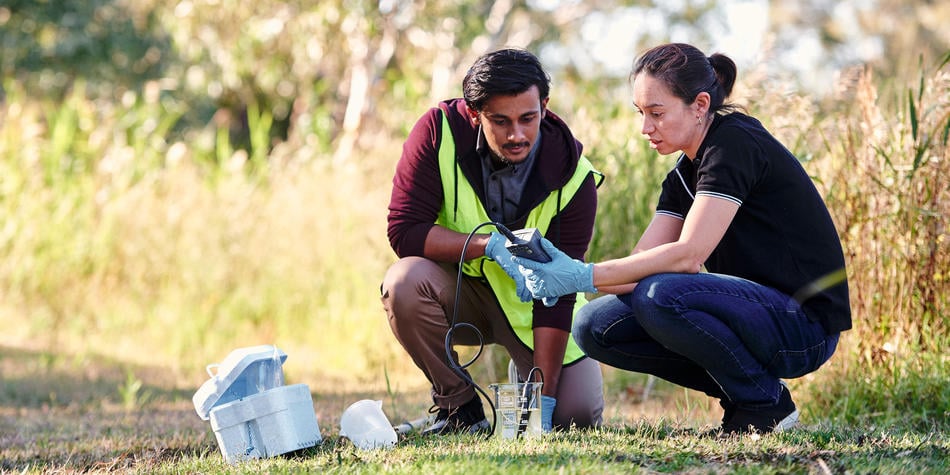As the demands on environmental and infrastructure sectors of engineering evolve, environmental engineers are in high demand and will continue to be for the foreseeable future.
We spoke to three industry experts to find out more about the issues and trends that are creating opportunities for environmental engineering graduates.
Various factors are driving a skills shortage of environmental engineers
While there is no single issue causing the skills shortage, Paul Northey, the Chief Regional Roads Officer at Regional Roads Victoria, says one influencing factor is the age profile of those working in government infrastructure.
‘My department are really looking at how we can get more graduates and younger engineers into our business because where we are currently is not sustainable in terms of our workforce demographics,’ Northey says. ‘There are some fantastic opportunities coming up, right across the state.’
Dr Lisa Mills, the Environment and Sustainability Manager at GeelongPort, says new environmental legislation that came into effect in 2021 is probably the most significant change to the industry in the last 50 years. These new requirements placed on industry will exacerbate the existing shortage of environmental engineers.
‘What it means for our business, and for many other infrastructure operations out there, is that there's a much greater focus on managing environmental impacts, particularly around soil contamination,’ Dr Mills explains.
‘If you think of any large infrastructure project, whether it's building a wind farm, a road, or a tunnel, movement of soil is a big part of that,’ Dr Mills says. ‘The requirements around managing that have increased significantly since the introduction of this new legislation.’
Industry needs graduates to tackle the challenge of developing infrastructure with a low footprint
Helen Vaughan, the Deputy Secretary, Water and Catchments at the Department of Environment, Land, Water and Planning (DELWP) says environmental engineers are highly sought after by industry involved with water management.
‘The industry needs engineers that can work across sectors to reduce environmental impacts; like increasing the use of renewable energy to reduce emissions associated with the treatment of water,’ Vaughan explains.
There will be continued need for engineers who can use better designs to implement integrated stormwater and recycled water solutions. Vaughan says DELWP’s draft Sustainable Water Strategy for the Central and Gippsland region shows that by 2065, an estimated 75% of water used in the region will be manufactured water.
‘For that manufacturing we need people who can keep the environmental footprint low but also be really innovative as to how they go about developing infrastructure,’ Vaughan explains.
The profile of an engineering career is changing
It’s a new type of engineer that is required going forward. ‘We've got different challenges now because of external factors like climate change, changes in population and different expectations from the community,’ Vaughan explains. ‘That means engineers are not just solving engineering problems, they're solving social and economic problems as well.’
Teams solving big problems require a variety of perspectives and Paul Northey says that Regional Roads Victoria is always looking to improve the diversity of the workforce. ‘We're trying to get a real mix of experience, capability and thought into our team, because that's going to enable us to deliver the best outcomes in terms of our overall programs and services,’ he says.
Engineers are enjoying flexibility with regional opportunities
One positive change to have come out of the pandemic is that you’re less likely to have to make a big move for your dream engineering job. ‘With COVID, we've all learned to work differently,’ Northey says. ‘There are real opportunities to be flexible and be able to manage projects in a much broader area than what's been done previously.’
Northey’s department now has consolidated project delivery teams with people located right across the state. ‘We're always still going to need people to spend some time out in the field, particularly in an infrastructure sense – that is an essential part of being a project manager – but there are ways that we can work in a more virtual environment and share resources around,’ he says. ‘Not only will that enable people to get more experience right across regional Victoria, but it should deliver efficiencies for us in terms of how we deliver our work.’
Having a regional background can really benefit engineers, Northey adds. ‘You can work back in a regional area and contribute to their regional communities but it doesn't limit you to that region.’
Study environmental engineering at Deakin to get the edge
When Lisa Mills works with Deakin graduates she finds the experience they have gleaned through Project Oriented Design Based Learning (PODBL) sets them apart. ‘As part of their degree they are working on real world projects,’ she explains. ‘That's different to other universities and it's really innovative. It gives students the taste of what it's like to be an engineer and sets them up for success.’
Another feature that stands out to Dr Mills is the links that the Deakin Engineering School has with industry. ‘Deakin students have access to a network of experienced engineers and mentors,’ she says. ‘Money can’t buy that type of advice, guidance and experience. Deakin does that so well.’
Helen Vaughan says that Deakin produces graduates who are able to fill gaps in their field. ‘Deakin has a really close connection to what industry really needs and what the community is expecting of future industry leaders.’
Across all disciplines, sustainability is becoming a central part of business practice. ‘Environmental engineers have a really natural link to working in the sustainability field,’ Dr Mills says. ‘There are not a lot of degrees out there that focus wholly and solely on sustainability, so an engineering degree is a nice foot in the door for this emerging discipline.’
Inspired to step into a field of opportunities? Learn more about the Bachelor of Environmental Engineering (Honours).

